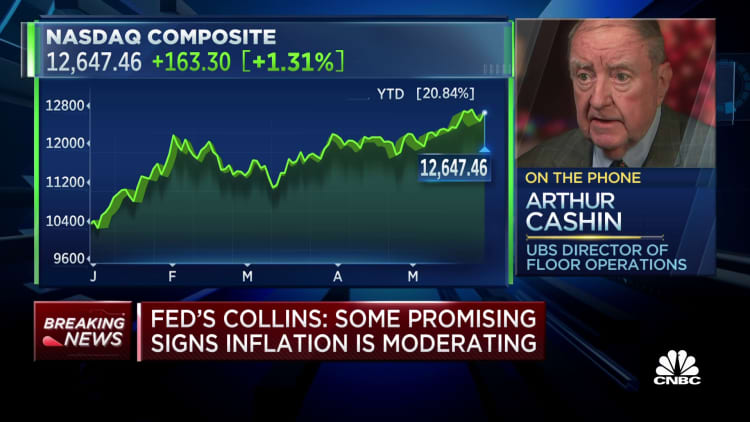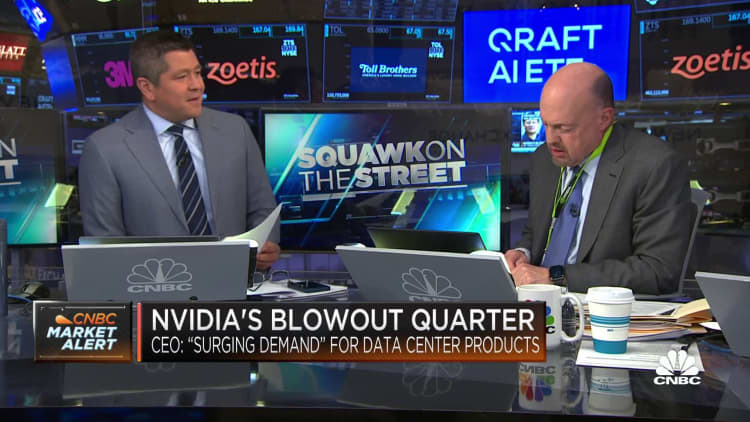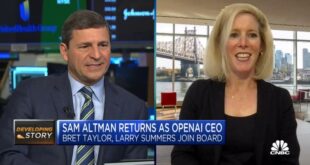A blockbuster profit report Wednesday from Nvidia crystallized an important point for both markets and the economy: For better or worse, artificial intelligence is the future.
Whether it’s personalized shopping, self-driving cars or a broad array of robotics uses for health care, gaming and finance, AI will become a factor in virtually everyone’s lives.
Nvidia’s massive fiscal first-quarter earnings helped quantify the phenomenon as the firm nears an elite cast of tech leaders with $1 trillion market valuations and clear leadership status both on Wall Street and in Silicon Valley.
“AI is real, AI is not a fad, and we’re only in the early innings,” said Steve Blitz, chief U.S. economist at TS Lombard. “Does it change the course of the economy over the next three to six months? Probably not. Does it change the economy over the course of the next three to six years? Absolutely, and in very interesting ways.”
Some of the changes Blitz foresees is a reduce in demand for foreign labor, a “point of sale” impact where coding and creative writing can be done by machines instead of people and a host of other activities that go beyond what appears obvious now.
Development of products such as OpenAI’s ChatGPT, a chatbot that converses with the user, have helped bring home the potential.
“It’s hard for me to overstate the value or the impact of AI, and it is in keeping with my view that this coming decade is all about the broader application of technology beyond what we’ve seen to date, beyond computers and phones, and that application has tremendous upside,” Blitz said.
Isolated impact so far
For Nvidia, the upside already has been apparent.
Shares soared more than 26% higher around midday Thursday, and the company’s market value surpassed $950 billion.
Broader market reaction, though, was underwhelming.
While the S&P 500 semiconductor index jumped 11.4%, the broader Nasdaq Composite rose a more muted 1.7%. The S&P 500 was up about 0.9%, while the Dow Jones Industrial Average slipped more than 50 points as investors continued to fret over the debt ceiling negotiations in Washington.

At the same time, worries of an economic slowdown persisted — despite his excitement over AI, Blitz still thinks the U.S. is headed for recession — and the lopsided market reaction served as a reminder of a stratified economy in which technological benefits tend to spread slowly.
“The spillover and the benefits that the rest of the economy will derive from AI is a multi-year multi-decade process,” said Peter Boockvar, chief investment officer at Bleakley Advisory Group. “Is this an incremental piece to growth or is this now diverting spending from other things because every other part of the economy, outside of spending on travel, leisure and restaurants, doesn’t seem to be going that well?”
Boockvar pointed out that small-cap stocks, for instance, were losing big Thursday, with the Russell 2000 off about 0.8% in early afternoon trading.
‘Serious holes in the economy’
That happened even though it seems those companies would benefit from the cost-savings aspects of AI such as the ability to reduce staffing expenses. Nvidia’s chief competitor in the chip space, Intel, also was getting slammed, down 6.2% on the session. Quarterly tech earnings on the whole declined 10.4% heading into this week, according to FactSet, though some of the biggest firms did beat Wall Street’s lowered expectations.
“There are some serious holes in the economy that we can’t ignore here,” Boockvar said. “If the AI craze cools, people will see that the underlying business trends of Microsoft, Google and Amazon are clearly slowing because we all breathe the same economic air.”
AI hasn’t been a winner for everyone, either.
DataTrek Research looked at nine big AI-related companies that came to market through initial public offerings over the past three years and found their collective valuation is down 74% from their debut levels.
The group includes UiPath, Pagaya Technologies and Exscientia. Their stocks have rallied in 2023, up an average of 41%, but the seven largest tech companies, a group that includes Nvidia, have surged an average 58%.
“So far, Big Tech has collectively benefited most from the buzz around gen AI. We think this trend will continue given their ability to leverage their global scale and large competitive moats when utilizing this disruptive technology,” DataTrek co-founder Nicholas Colas wrote. “Gen AI may end up making US Big Tech even bigger and more systematically important, rather than allowing upstarts to play the classic role of disruptive innovators.”
Indeed, market veteran Art Cashin noted that without the Big 7 stocks the S&P 500 would surrender all of its 8% gain this year.
“You know, supposedly, the high tide lifts all boats,” the director of floor operations for UBS said on CNBC’s “Squawk on the Street.” “This is a very selective tide. And I’m not ready to throw out the confetti yet.”

 EU News Digest Latest News & Updates
EU News Digest Latest News & Updates


